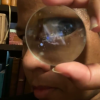Each worker in a colony is a tremendous investment in resources and time. Other insect larva fend for themselves. Not ants. During their growth state they must be tended to, fed, cleaned or they will die. They need help to eclose properly. The process can take months.
I think this is why ants are so enjoyable to watch. They are always interacting with each other in ways that go beyond predator and prey and mating... which is all you tend to see with other insects.
The complexity of colony life have given ants some of the largest brains of insects. (which is kind of like being the world's largest sparrow... but still) ants need to learn more than the average insect. They need to learn the tunnels of their colony, the local landscape, the best places to find food, the typical dangers of the environment...
So, back to the larva. We kind of think of them as little inert blobs that just eat and eat... but they do already have a nervous system. They interact with adult ants, and help with colony tasks with the assistance of adults (mostly digesting food and in some cases making silk) so, I'm curious if an ant larva can be conditioned like an adult ant can? Could you teach a larva to wiggle for food? Or to curl up protectively based on a vibration? How would the larva react once it's an adult ant to the same stimuli?
I'm aware that such transference happens with moths and butterflies. But I'm curious to know about ants in particular since ... this long period of learning that ants have as they integrate into the colony fascinates me. I'm wonder ... could the learning start in the larval stage?
For example as the adult ants feed the larva they would learn about local food sources. Learn if the colony needs more protein or sugars. As they get moved around the deep chambers of the nest they would learn the colony smell and the size of the colony might be inferred.
So the next question is could you condition an larva in one colony then let it eclose in another and show that ... there was some effect. Raider ants are responsible for this...
Or maybe larva are just blind food bags...

















